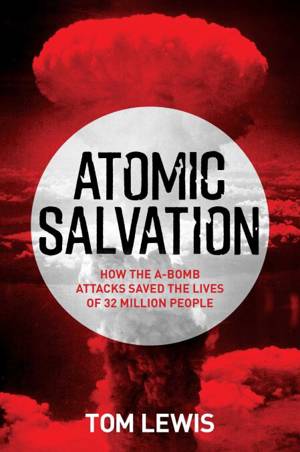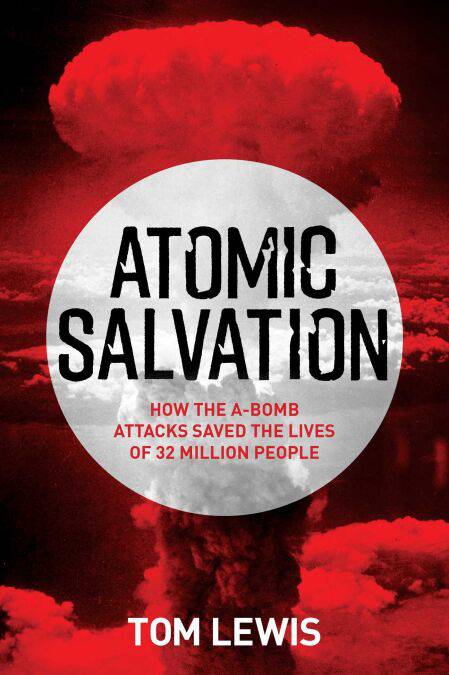
- Retrait gratuit dans votre magasin Club
- 7.000.000 titres dans notre catalogue
- Payer en toute sécurité
- Toujours un magasin près de chez vous
- Retrait gratuit dans votre magasin Club
- 7.000.0000 titres dans notre catalogue
- Payer en toute sécurité
- Toujours un magasin près de chez vous
Atomic Salvation EBOOK
How the A-Bomb attacks saved the lives of 32 million people
Doctor Tom Lewis
Ebook | Anglais
7,71 €
+ 7 points
Description
So did not the atomic weapons bring about a great peace?
Since the initial grateful acknowledgement of the success of the A-bomb attacks in ending World War II, there has been a steady reversal of opinion and sentiment: from a first hearty appreciation to a condemnation by many, of the United States for its actions.
Atomic Salvation investigates the full situation of the times to a previously unplumbed depth. It examines documents from both Japanese and Allied sources, but it uses logical in-depth analysis to extend beyond the mere recounting of statistics. It charts the full extent of the possible casualties on both sides if a conventional assault akin to D-Day had gone ahead. The work is concerned solely with the military necessity to use the bombs, but it also investigates why that necessity has been increasingly challenged over the successive decades.
Controversially, the book shows that the Japanese nation would have lost many millions of their people – likely around 28 million – if the nation had been attacked in the manner by which Germany was defeated: by amphibious assault; artillery and air attacks preceding infantry insertion, and finally by subduing the last of the defenders of the enemy capital.
From the other side, the book investigates the enormous political pressure placed on America as a result of their military situation. The USA’s Truman Administration had little choice but to use the new weapon given the more than a million deaths Allied forces would undoubtedly have suffered through conventional assault.
Through investigation of reactions then and since, Atomic Salvation charts reaction to the bombings. It looks briefly at a range of reactions through the decades and shows that there has been relentless pressure on the world to condemn what at the time was seen as the best, and the only, military solution to end the war.
Never has such an exhaustive analysis been made of the necessity behind bringing World War II to a halt.
Since the initial grateful acknowledgement of the success of the A-bomb attacks in ending World War II, there has been a steady reversal of opinion and sentiment: from a first hearty appreciation to a condemnation by many, of the United States for its actions.
Atomic Salvation investigates the full situation of the times to a previously unplumbed depth. It examines documents from both Japanese and Allied sources, but it uses logical in-depth analysis to extend beyond the mere recounting of statistics. It charts the full extent of the possible casualties on both sides if a conventional assault akin to D-Day had gone ahead. The work is concerned solely with the military necessity to use the bombs, but it also investigates why that necessity has been increasingly challenged over the successive decades.
Controversially, the book shows that the Japanese nation would have lost many millions of their people – likely around 28 million – if the nation had been attacked in the manner by which Germany was defeated: by amphibious assault; artillery and air attacks preceding infantry insertion, and finally by subduing the last of the defenders of the enemy capital.
From the other side, the book investigates the enormous political pressure placed on America as a result of their military situation. The USA’s Truman Administration had little choice but to use the new weapon given the more than a million deaths Allied forces would undoubtedly have suffered through conventional assault.
Through investigation of reactions then and since, Atomic Salvation charts reaction to the bombings. It looks briefly at a range of reactions through the decades and shows that there has been relentless pressure on the world to condemn what at the time was seen as the best, and the only, military solution to end the war.
Never has such an exhaustive analysis been made of the necessity behind bringing World War II to a halt.
Spécifications
Parties prenantes
- Auteur(s) :
- Editeur:
Contenu
- Nombre de pages :
- 364
- Langue:
- Anglais
Caractéristiques
- EAN:
- 9781922387035
- Date de parution :
- 07-07-20
- Format:
- Ebook
- Protection digitale:
- Adobe DRM
- Format numérique:
- ePub

Les avis
Nous publions uniquement les avis qui respectent les conditions requises. Consultez nos conditions pour les avis.






